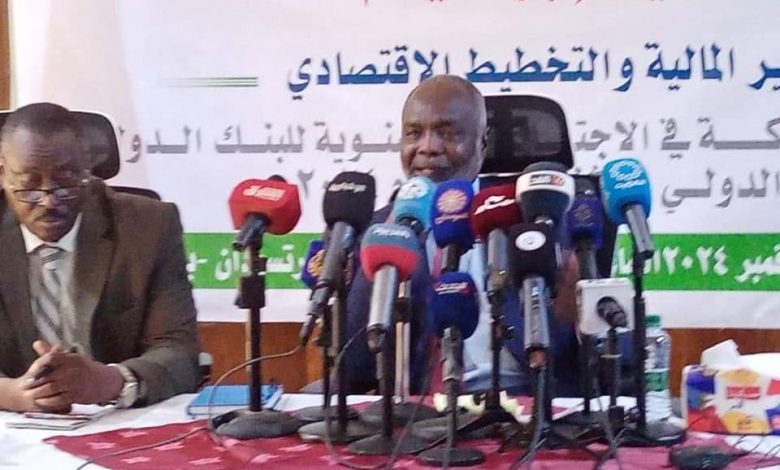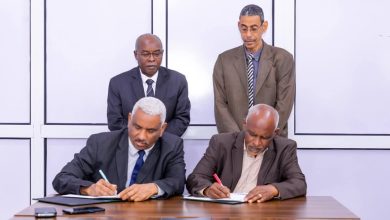Economic
Minister of Finance Reveals Protest Filed with IMF and World Bank

Sudan Events – Rahab Abdullah
The Minister of Finance and Planning, Dr. Jibril Ibrahim, disclosed that Sudan has requested the World Bank and the International Monetary Fund (IMF) to expedite the procedures for releasing funds allocated to Sudan, scheduled for June 2025.
Dr. Ibrahim announced that a formal protest had been filed with these international institutions due to the slow disbursement of funds, which are intended to be delivered through UNICEF and the World Food Program. Speaking at a press conference on Sunday in Port Sudan about the outcomes of his participation in the IMF and World Bank annual meetings, he highlighted expected funds, including $100 million from the World Food Program, $112 million for health emergencies, $42 million for education, $100 million for social emergencies, and $100 million from the African Development Bank for wheat production and for providing seeds and fertilizers for the winter season. Additionally, discussions were held with the Kuwaiti Fund to allocate funds for health emergencies.
Dr. Ibrahim affirmed that the Ministry of Finance is doing its utmost to resolve issues affecting citizens and has prepared a reconstruction plan to present to the Sovereignty Council soon. He defended the ministry, asserting it has full authority and is functioning effectively, saying, “The ministry has not been dismantled or rendered ineffective.”
He acknowledged observations regarding the dismissal of the Director General of the Tax Bureau, noting that decisions about appointments or dismissals of staff should be made through official channels and should involve the Minister, acknowledging an error in procedure. He stressed that the Ministry of Finance’s authority remains intact and that Sudan has not sought loans from the IMF or World Bank; the $300 million in allocated funds are support contributions intended for vulnerable or low-income countries.
Dr. Ibrahim dismissed claims about an increase in the dollar rate, clarifying that there is no longer a “customs dollar” since the unification of exchange rates in 2021. He acknowledged challenges facing customs in aligning with daily market exchange rates, which sometimes gives the appearance of rate adjustments.
Efforts are ongoing, he affirmed, to secure hundreds of millions of dollars to alleviate the burden on citizens, with both internal and external efforts to support health, education, and services.
Dr. Ibrahim refrained from providing figures on government losses due to the ongoing war, explaining that with ongoing conflict, estimates quickly become outdated. He emphasized the need for regional expertise to accurately assess the damage, noting that requests and proposals for reconstruction have been submitted to international institutions.
He also revealed that a Memorandum of Understanding with the UAE regarding a partnership to establish the Bashayer Port has been canceled.
Dr. Ibrahim pointed out that recent government job announcements include roles associated with promotions, while others may encounter challenges, noting the transparency intended in announcing these roles. He denied any knowledge of individuals from political group Qahat working in Ministry of Finance-affiliated institutions, adding that anyone hindering work should be immediately removed.
Dr. Ibrahim explained that fluctuations in the foreign exchange and dollar market were due to fuel purchases and the high daily fees of up to $60,000 for fuel-carrying ships. He mentioned instructions were issued to the Ministry of Energy and Petroleum to regulate fuel imports based on the country’s needs.
He confirmed that although food supplies are available, current conditions may impede their delivery to markets.
Dr. Ibrahim also announced that wage discrepancies will be addressed in the 2025 budget and affirmed that the Sudanese government has backed away from plans for an Emirati investment project at Abu Amma Port, valued at $6 billion, emphasizing, “We will not give even one centimeter to the UAE after what happened.” He noted that the UAE continues to provide logistical, political, and media support to the rebels.
He pointed out the surplus electricity in Port Sudan and Merowe despite weaknesses and issues in the transmission networks serving other Sudanese states, and stressed the comprehensive coordination between fiscal and monetary policies despite recent conflicts.
Dr. Ibrahim expressed hope for establishing a peace-oriented budget for 2025 and committed to improving wages and paying backlogged salaries after the end of the war.



